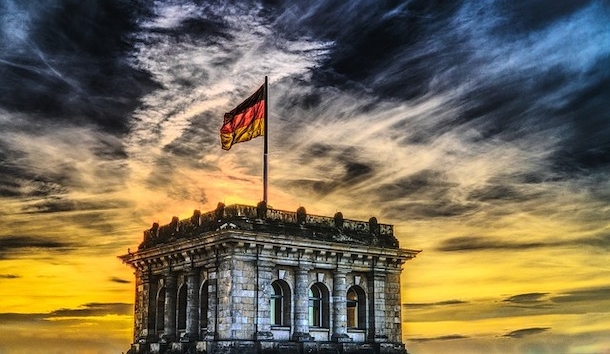An important foreign story consistently underreported in the U.S. is the remarkable rise of the Alternative for Germany (AfD) in the eastern states of the Federal Republic. Regional elections will be held on September 1 in two of them, Brandenburg and Saxony. Angela Merkel’s “center-right” Christian Democratic Union (CSU) and her “center-left” coalition partners (Sozialdemokratische Partei Deutschlands, SPD) will suffer unprecedented defeats in both.
Quotation marks are in place because the old left-right divide is meaningless. The two big parties have ruled Germany continuously since 1949 (minus the five East German Länder prior to reunification in 1990), and they form the backbone of Germany’s political establishment. They are both Euro-federalist, alien-welcoming, multicultural guardians of the liberal order. The CSU-SPD de facto duopoly is ideologically fully compatible with the approved opposition: the pro-business Free Democrats (Freie Demokratische Partei, FDP) on the “right,” and the ever more unhinged Greens (Grüne) on the “left.”
The duopoly, misleadingly known as the Volkspartei, has presided over systematic infantilization of German politics. Its leaders have developed a system which mandated the issues which can be debated in public fora–reducing carbon emissions, combating racism, integrating migrants, preserving the welfare state, making “Europe” (the EU) more functional, etc.–and which are verboten, including all forms of critical discourse on immigration, German identity, culture and demography, on geopolitics in general, and the Brussels machine in particular.
Federal elections were held on September 24, 2017, however. The “far-right” AfD, long demonized by the media and mainstream politicians, entered the Bundestag with 12.6 percent of the vote–more than double the five percent qualifying threshold–and the old straitjacket started bursting at the seams. For the first time a political party explicitly opposed to the ongoing immigrant deluge, to the promotion of invented rights for the ever-growing list of invented minorities, to the subjugation of sovereignty to the EU Leviathan, and to the criminalization of German history and identity, became a legitimate participant in the political process. It is now the strongest opposition party in the Bundestag.
The September 1 elections in Saxony and Brandenburg, and another one in Thuringia on October 27, are important because they will reaffirm a deep political, social and moral schism which exists between the former East Germany and the more affluent western lands. Recent surveys indicate that the AfD is ahead of both CDU and SPD in Brandenburg at 21 percent, while running neck and neck with the Social Democrats in Saxony at 26 percent. Its overall support in the former East Germany is just under 25 percent, in marked contrast to the party’s nationwide support which stands at around 15 percent.
The picture is further complicated by the continuing strength of the Left Party (die Linke), a direct descendant of the East German Communist Party (SED), in the East. It is currently in coalition with the SPD in Brandenburg, but a wider coalition–possibly including the Greens, or the CDU, or both–may be needed after the election to keep the AfD at bay. It is noteworthy that all of those parties have pledged not to work with the AfD. The fact that they are willing and able to overcome their differences in order to stop the only party adamantly opposed to the established order reflects the fundamental reality of German politics.
To their visible frustration the AfD has conducted an effective campaign with the slogan “Wende 2.0.” Originally the “Turnaround” described the period of rapid and dramatic change after the fall of the Berlin Wall in November 1989 which preceded the reunification a year later. Vollende die Wende, “Complete the Turnaround,” cleverly implies that the AfD is carrying the mantle of the Peaceful Revolution of 30 years ago. This has prompted howls of protest from a hundred former East German dissidents who support the mainstream parties.
The AfD will not take power in either Brandenburg or Saxony in September or in Thuringia in October. It will get between 23 and 27 percent of the vote, though, and gain greater influence and visibility both locally and nationally. Immigration and asylum laws remain a very important issue for millions of Germans, although the mainstream parties and Germany’s uniformly liberal media machine pretend otherwise. It is the most important issue in Saxony, closely followed by the related problem of internal security, with the economy, education, housing, and social policy lagging far behind.
This order of priorities, eminently rational, confirms what we have known for a long time: that Soviet communism, with its crude Pavlovian methods of control, has been far less corrosive to the health of nations and communities than Western liberalism and internationalism, which rely on the implantation of subliminal messages by Freudian means. The key pillar of that message is that all nations are but social arrangements, artificial, temporary, and–especially in Germany’s case–potentially dangerous. This has made the liberal German state deeply hostile even to the most benign understanding of national or ethnic coherence. Estranged from their parents, ignorant of their culture, ashamed of their history, millions of young western Germans subjected to denazification were duly de-Germanized.
Under communism the State tried but failed to subjugate the Nation; under liberalism, the State gradually and gently destroyed the Nation. Hungary, Poland and the Czech Republic provide evidence of healthy toughness, with their determined resistance to the imposition of migrant quotas from Brussels; this is in stark contrast to the pliant, alien-welcoming denizens of Benelux or Scandinavia. East Germany is an even more poignant example of this phenomenon, because it demonstrates that the same rule applies even within the same nation. The Rheinland, Hessen, Baden and Wuerttemberg are far gone, but there is still hope between the Oder and the Elbe.



Leave a Reply